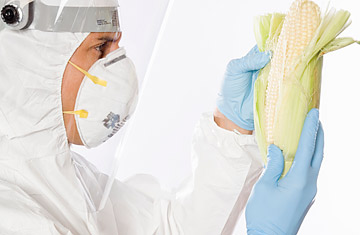
The Senate's Food Safety Modernization Act, prematurely announced as a done deal a week ago, is stalled again — or "doomed," if you go by some news outlets. In any case, it's in trouble. The Senate bill contains provisions for fees that could technically be considered taxes, and any bill with taxes has to start in the House. Nobody seems to have thought of this, and the clock is ticking as this little technical error morphs into a "potentially fatal" flaw. Part of the mystery lies in the fact that everybody seems to want our food to be safer — so much so that the bill had the support of both parties, a consensus that these days is as rare as plutonium. In any case, the chances of getting a newly empowered FDA to protect us from pestilence are slim. But would our food supply be that much safer if the act ends up passing? I don't think so. I think the bill is a poor one. Here's why:
Having power isn't the same thing as exercising it. The bill would give FDA officials, at long last, the ability to issue recalls of contaminated food, rather than just ask nicely for them, as is their current practice. The agency would be able to require more frequent inspections and several other regulatory upgrades. But so what? There are any number of regulatory agencies within the government that are taken about as seriously as the referee at WrestleMania. One need only think of the SEC's swift moves to head off a financial calamity, or the EPA's draconian enforcement of air and water standards among coal companies, to feel better about what's being sold at your local supermarket.
Even if the FDA does flex its muscles, it won't radically overhaul our nation's food supply. As conservative critics of the bill have rightly pointed out, bi- or even triannual inspections of a lettuce plant hardly guarantee that evil microbes won't be there the rest of the time. The bigger problem with our food system is that it's gigantically centralized, with produce from dozens or even hundreds of farms ending up in one place. And that food then gets distributed in a gazillion places. While the bill does include provisions to create a system that can rapidly track down the sources of an infection, even under the best of circumstances, citizens will be barfing in several states by the time the recall comes.
Oh, by the way, the bill doesn't include meat. What? Really? That was my response when I found this out, and I am betting it will be yours, too. The FDA doesn't have any authority over unwholesome hamburgers teeming with E. coli, chickens stewed in salmonella broth, or processed meats with more chemicals in them than a meth lab. Meat still falls under the USDA's domain, which is totally unaffected by this bill.
Big Business loves the bill. A number of the legislation's critics call it out for the burden it will place on midsize businesses. There's no question that it's a lot easier for a massive agribusiness concern to come up with hazard analysis and critical control points (HACCP) than it is for their smaller rivals to do so. (The smallest farms will be spared, thanks to an amendment by Montana Senator Jon Tester, himself an organic farmer.) The biggest companies already have their own HACCP plans in place, for what that's worth, and it will fall on their competitors to develop their own.
By now, you may be wondering if we would better off without the bill. Yes, it will be expensive, and yes, it might not help much. But I am behind the bill, and want it to pass, however impotent and futile it may be. We need more regulation in our food supply, and in America generally, not less. The short-term impulses of businesses are not always best for us, or even themselves. And the existence of even a slightly strengthened FDA is enough to send them a signal, just as even a slothful, doughnut-munching Chief Wiggum is a better deterrent to criminals than no policeman at all. Furthermore, though it is rarely mentioned, the best part of the law is that it extends regulatory power to imported foods. If American plants are sometimes a little less than stringent in their hygiene, you can imagine what the ones are like in China and other go-go economies. For that reason alone, the bill should be passed. We may sometimes wish for China's economic mojo, but nobody wants it as a model for food-safety oversight.
Josh Ozersky is a James Beard Award—winning food writer and the author of The Hamburger: A History. His food video site, Ozersky.TV, is updated daily. He is currently at work on a biography of Colonel Sanders. Taste of America, Ozersky's food column for TIME.com, appears every Wednesday.
